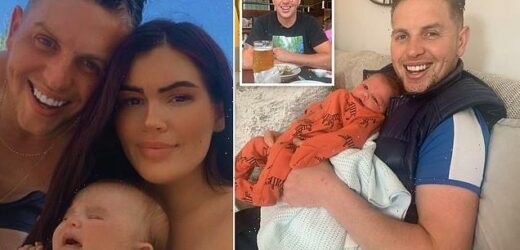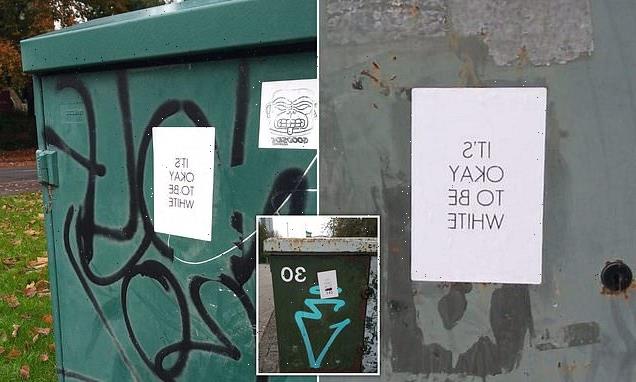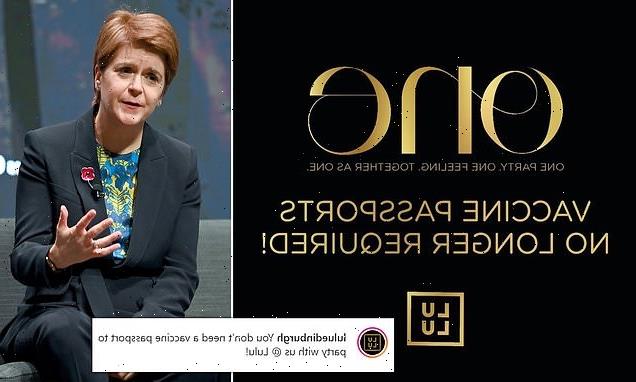Businessman who fought brain tumour and feared he’d never have children reveals joy at becoming a father at 32 after 170 ROUNDS of chemotherapy
- Man who fought cancerous brain tumour welcomed his first baby without IVF
- Jonathon Jones, 32, has had 170 round of chemotherapy to keep tumour at bay
- At 17, he was told he’d only survive another two weeks without urgent surgery
- He feared he would never have children as chemo drugs can make men infertile
A man has welcomed his first child after having 170 rounds of chemotherapy to fight a cancerous brain tumour.
Jonathon Jones, 32, of Solihull, West Midlands, was diagnosed with the tumour at age 17 after doctors said it was ‘the size of an orange’ – but now 14 years later he has welcomed his first child, JJ, with his partner Danielle Taylor.
Mr Jones, who works as a businessman, has had 170 rounds of chemotherapy to keep the brain tumour at bay and was able to father his child without needing IVF.
He feared he’d never be able to have children because the chemo drugs he was taking can lead to infertility and subsequently he froze his sperm when he was a teen.
Jonathon Jones, 32, of Solihull, West Midlands, (Pictured Left) has welcomed his first child, JJ, (Pictured Right) after having 170 rounds of chemotherapy to fight a cancerous brain tumour
Mr Jones, (Above) who works as a businessman, has had 170 rounds of chemotherapy to keep the brain tumour at bay and was able to father his child without needing IVF
The businessman (Pictured Right) was diagnosed with the tumour at age 17 after doctors said it was ‘the size of an orange’ – but now 14 years later he has welcomed his first child, JJ, (Middle) with his partner Danielle Taylor (Pictured)
Mr Jones said: ‘I’d always wanted to be a dad, but I didn’t think I would ever have a child as I have had over 170 rounds of chemo.
‘JJ is an absolute miracle and was conceived naturally, although we were looking into IVF.
‘I really think my story will inspire other people to remain strong and hopeful.’
In the six years before his diagnosis his behaviour had been extremely challenging, getting him expelled from schools and in trouble with the police.
His mother took Mr Jones to several counsellors and private hospitals in search of answers.
He was prescribed ADHD medication, but when that failed the family took drastic action and asked for him to be sectioned at The Priory, which again provided no answers as there was nothing psychologically wrong with him.
By age 17, Mr Jones went on a trip to Hong Kong with a friend and his family where he started to suffer ‘terrible headaches’.
He explained: ‘It was a turning point. I suffered terrible headaches whilst I was there.
‘I put it down to jet lag and drinking alcohol. Ironically drinking was the best thing I could have done for my symptoms as it dehydrated me which in turn reduced the swelling in my brain.’
Mr Jones said: ‘JJ (Pictured) is an absolute miracle and was conceived naturally, although we were looking into IVF’
When he returned, he went on a trip to Newquay to celebrate finishing school but things went ‘from bad to worse’ and he was so poorly had to be driven home.
‘That was the last time I was able to get out of bed,’ He added.
‘My mum and step dad took me to hospital and demanded they check the pressure behind my eyes. Apparently this was normal.
‘Mum and my stepdad then took me to the doctors on many occasions and I was told either that I had a hangover or a viral infection. My family were frantic.’
Mr Jones’s mother took him back to the doctors at the end of July 2007 and demanded a brain scan.
The consultant looked into his eyes, said nothing and ran out of the room to order an urgent MRI scan.
Within the hour he was diagnosed with a brain tumour the size of an orange.
Surgeons cancelled other patients to get Mr Jones into surgery at University Hospital Coventry.
Unknown to him his mum was told there was a 30% he would die on the operating table and that if the tumour had been left another two weeks the tumour would have killed him.
Seven hours of surgery later, 98% of the huge growth had been removed.
By 2019, Mr Jones met personal trainer Danielle (Pictured) in a bar in Birmingham in 2019. The pair want to try for another baby next year
It was tested and revealed to be a cancerous Oligodendroglioma and he was given radiotherapy.
Doctors told him he would need chemo for the rest of his life to keep the tumour at bay and he has been on chemo drugs ever since – with 2021 his 14th year of treatment.
He is now on four-weekly cycles, to be extended to six-weekly as he gets older.
Worried about his fertility, Mr Jones also had his sperm frozen when he was diagnosed in case he wanted to become a dad at a later date.
By 2019, Mr Jones met personal trainer Danielle in a bar in Birmingham in 2019.
He admitted: ‘It was instant. I’d given up on meeting people. She was different.’
The couple suffered an unplanned pregnancy after five months and were gutted to miscarry, so planned to do IVF after consulting with their GP.
But amazingly they conceived naturally again after six months.
The result is their son JJ, born on May 8 this year.
Cancer treatment can slow or stop sperm production altogether and some men become permanently infertile.
Danielle has two kids from a previous relationship – Brody, five, and Sophia, seven – and they now want another baby next year.
Mr Jones has taken part in charity runs and also set up his own clothing business called No Brainer, with part of the proceeds going to the Brain Tumour Charity.
The businessman said he thinks GPs should take brain tumour symptoms more seriously.
And he said he wouldn’t have made it through without the support of his family and friends.
He added: ‘To be able to raise awareness and give hope means the world to me.
‘With JJ and Danielle, my life aside from the chemo is perfect. JJ is such a blessing.’
How do brain tumours cause personality changes?
Brain tumours and surgery can cause extreme personality changes.
As a brain tumour grows, it puts pressure on surrounding tissue affecting the function, process or part of the body that is controlled by that area of the brain.
Personality changes are most common in people when the tumour is located in their frontal lobe, which controls personality, behaviour and emotions, problem solving and long-term memory.
Personality changes can also be caused by a tumour in the pituitary gland which controls hormone levels.
This can result from treatments including surgery, radiotherapy and chemotherapy.
Changes in personality and behaviour that have occurred as a direct or indirect result of these treatments usually pass gradually as people recover.
Large tumours can have a greater effect as they affect a greater area. However, even a small tumour in a key structure of the brain can have a significant impact.
Personality changes might also be experienced as a natural reaction to the diagnosis and treatment.
The emotional impact of the diagnosis, undergoing treatment, and the lifestyle changes that are often necessary for a person living with a brain tumour, can affect mood, general persona and can cause a person to become more irritable.
Source: Read Full Article







